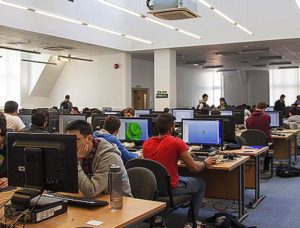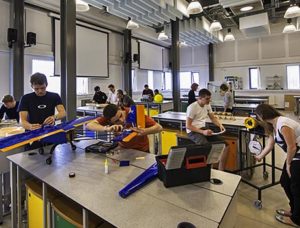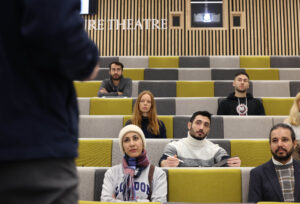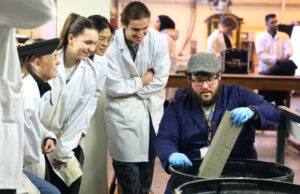Civil Engineering
UCAS code H202
- Study mode
- Full-time
- Duration
- 4 years
- Start date and application deadlines
-
- Start date
UCAS code H202
Civil engineers are responsible for the design, project management and construction of the physical infrastructure of our society. Our broad-based, vocational programme covers all the required aspects of a civil engineer’s education, with an emphasis on applying your learning in context.
You will be introduced to the essentials – everything from structural analysis and design, materials, ground engineering, water supply and sanitation, to the digital built environment and its digitisation. You’ll also study relevant subjects such as maths, computer-aided drawing, and communication skills. You will be given an understanding of the climate crisis and the biodiversity crisis and learn how civil engineers can play their part in addressing these global challenges.
A range of individual and group design exercises provide an opportunity for industrial feedback and this is supplemented by site visits. Our teaching staff offer projects based on their research expertise.
Students are encouraged and supported to gain relevant work experience to enhance their employability by applying for a summer internship or a year placement with an approved company/organisation.
Civil engineering graduates are in great demand and our programme aims to provide the educational base for graduates who demonstrate great skills in critical thinking, collaboration, communication and creativity.
This programme also has a year abroad option, an incredible opportunity to spend an academic year at one of our partner universities.
• The key aspects underpinning the field of Civil Engineering
• Leading and working in teams
• How to undertake research
• Adapting to a busy hands-on industry environment
• Critical thinking
• Teamwork
• How to present and communicate clearly
This degree is accredited by the Joint Board of Moderators (JBM) comprising the Institution of Civil Engineers, Institution of Structural Engineers, Institute of Highway Engineers, the Chartered Institution of Highways and Transportation and the Permanent Way Institution on behalf of the Engineering Council for the purposes of fully meeting the academic requirement for registration as a Chartered Engineer (CEng).

These programmes are accredited by the Joint Board of Moderators, which represents five major civil engineering institutions and accredits civil engineering programmes on behalf of the Engineering Council, which sets and maintains the standards for the engineering profession in the UK. The MEng degree is accredited as fully satisfying the educational base for a Chartered Engineer (CEng). The BEng degree is accredited as: (i) fully satisfying the educational base for an Incorporated Engineer (IEng) and (ii) partially satisfying the educational base for a Chartered Engineer (CEng). A programme of accredited further learning will be required to complete the educational base for CEng. See jbm.org.uk for further information and details of further learning programmes for CEng.

We’re proud to announce we’ve been awarded a Gold rating for educational excellence.
Discover what you'll learn, what you'll study, and how you'll be taught and assessed.
Programme details and modules listed are illustrative only and subject to change.
Programme details and modules listed are illustrative only and subject to change.
| Optional modules | Credits |
|---|---|
| INTRODUCTION TO FINITE ELEMENTS (ENGG302) | 7.5 |
| UNCERTAINTY, RELIABILITY AND RISK 1 (ENGG304) | 7.5 |
| STRUCTURAL DYNAMICS (ENGG301) | 7.5 |
| EARTHQUAKE ENGINEERING (CIVE342) | 7.5 |
Programme details and modules listed are illustrative only and subject to change.
| Optional modules | Credits |
|---|---|
| COASTAL AND ESTUARY PROCESSES (CIVE487) | 15 |
| POLITICS OF THE ENVIRONMENT (ENVS525) | 15 |
Programme details and modules listed are illustrative only and subject to change.
Our degree programmes encompass the development of a holistic, systems approach to engineering. Technical knowledge and skills are complemented by a sound appreciation of the life-cycle processes involved in engineering and an awareness of the ethical, safety, environmental, economic, and social considerations involved in practicing as a professional engineer.
You will be taught through a combination of face-to-face teaching in group lectures, laboratory sessions, tutorials, and seminars. Our programmes include a substantial practical component, with an increasing emphasis on project work as you progress through to the final year. You will be supported throughout by an individual academic adviser.
Assessment takes many forms, each appropriate to the learning outcomes of the particular module studied. The main modes of assessment are coursework and examination. Depending on the modules taken, you may encounter project work, presentations (individual and/or group), and specific tests or tasks focused on solidifying learning outcomes.
We have a distinctive approach to education, the Liverpool Curriculum Framework, which focuses on research-connected teaching, active learning, and authentic assessment to ensure our students graduate as digitally fluent and confident global citizens.
The Liverpool Curriculum framework sets out our distinctive approach to education. Our teaching staff support our students to develop academic knowledge, skills, and understanding alongside our graduate attributes:
Our curriculum is characterised by the three Liverpool Hallmarks:
All this is underpinned by our core value of inclusivity and commitment to providing a curriculum that is accessible to all students.
The qualifications and exam results you'll need to apply for this course.
| Qualification | Details |
|---|---|
| A levels |
BBC (including Mathematics: B) |
| BTEC Level 3 national extended diploma |
DDM and Mathematics grade B at A Level. |
| BTEC combinations |
BTEC National Diploma DM plus B in Mathematics at A level; BTEC National Extended Certificate M plus BB including Mathematics at A level at grade B. |
| Welsh Baccalaureate Advanced |
C in the Welsh Baccalaureate, plus BB at A level to include Mathematics grade B. |
| Access |
Pass relevant Access to HE Diploma with 45 Level 3 credits with 27 at Distinction and 18 at Merit |
Studying with us means you can tailor your degree to suit you. Here's what is available on this course.
University of Liverpool students can choose from an exciting range of study placements at partner universities worldwide.
Immerse yourself in Chinese culture on an optional additional year at Xi'an Jiaotong Liverpool University in stunning Suzhou.
Broaden your world by spending an additional year of study at a partner university abroad following your second year of study.
Spend a summer abroad on a study placement or research project at one of our worldwide partner institutions.
Year in industry placements give you an in-depth workplace experience where you can develop your skills and apply your learning.
If you'd like to undertake a year in industry, you can transfer to Civil Engineering with Year in Industry MEng during your studies, subject to meeting the academic requirements of your course.
To spend a year in industry, you'll need to secure a placement with an organisation. If you're unable to find a placement, you'll continue with the standard version of the course without a year in industry.
Every student at The University of Liverpool can study a language as part of, or alongside their degree. You can choose:
This course is also available as a three year BEng (Hons) programme.
Your course will be delivered by the School of Engineering, which is home to world-class teaching and learning facilities, designed to provide for the distinctive way engineering students engage actively with their learning process. The school’s impressive specialist engineering research facilities also provide the setting for practical work and many student projects.






From arrival to alumni, we’re with you all the way:
In year two of the course we went to the constructionarium in Norfolk and built a scale model of the Millau viaduct. It’s a really well-respected University and course. It gives you everything you need for the future.

Want to find out more about student life?
Chat with our student ambassadors and ask any questions you have.
We are committed to developing the modern professional engineers for the future, ensuring that learning environments reflect future working environments. The skills gained through studying a degree in Civil Engineering equip our graduates with the knowledge necessary to excel in an ever-changing industry.
Many graduates have moved on to have careers with employers such as:
4 in 5 of our engineering students find their main activity after graduation meaningful.
(Graduate Outcomes, 2018-19.)
Your tuition fees, how to pay, and other costs to consider.
Full-time place, per year - £9,535
Year in industry fee - £1,905
Year abroad fee - £1,430 (applies to year in China)
Full-time place, per year - £29,100
Year in industry fee - £1,905
Year abroad fee - £14,550 (applies to year in China)
The tuition fees shown are correct for 2025/26 entry. Please note that the year abroad fee also applies to the year in China.
Tuition fees cover the cost of your teaching, assessment, operating University facilities such as libraries, IT equipment, and access to academic and personal support.
We understand that budgeting for your time at university is important, and we want to make sure you understand any course-related costs that are not covered by your tuition fee. This includes a lab coat, safety boots, and a residential construction course.
Students should expect to cover the following costs:
Lab coats
Students are required to wear a lab coat for all Engineering laboratory sessions. Students may purchase a lab coat at the start of the year from the Student Support Office at a subsidised cost of £15.
Safety boots
Students will be required to wear safety shoes or boots (with both toe cap and midsole protection conforming to European safety legislation) for some activities. Boots must be provided by the students.
Other safety equipment.
All essential safety equipment, other than those listed above, is provided free of charge by the department.
The ‘Constructionarium’
During year two, you will have a week of residential, hands-on construction experience at ‘The Constructionarium’. There is an additional cost of up to £250 for the Constructionarium.
We offer a range of scholarships and bursaries that could help pay your tuition and living expenses.
If you’re a UK student joining an undergraduate degree and have a household income below £35,000, you could be eligible for a Liverpool Bursary worth up to £2,000 for each year of undergraduate study.
Apply for an Asylum Seekers Scholarship and you could have your tuition fees paid in full and receive help with study costs. You’ll need to have applied for asylum in the UK, or be the dependant of an asylum seeker, and be joining an eligible undergraduate degree.
If you’ve spent 13 or more weeks in Local Authority care since age 14, you could be eligible for a bursary of £3,000 per year of study. You’ll need to be a UK student joining an eligible undergraduate degree and be aged 28 or above on 1 September in the year you start.
Are you a UK student with a Black African or Caribbean heritage and a household income of £25,000 or less? You could be eligible to apply for a Cowrie Foundation Scholarship worth up to £8,000 for each year of undergraduate study.
If you’re a UK student identified as estranged by Student Finance England (or the equivalent UK funding body), you could be eligible for a bursary of £1,000 for each year of undergraduate study.
Joining a School of Biosciences degree and have a household income of less than £25,000? If you’re a UK student, you could apply to receive £4,500 per year for three years of your undergraduate course.
Do you live in the Liverpool City Region with a household income of £25,000 or less? Did neither of your parents attend University? You could be eligible to apply for a Nolan Scholarship worth £5,000 per year for three years of undergraduate study.
Are you a UK student with a household income of £25,000 or less? If you’ve participated in an eligible outreach programme, you could be eligible to apply for a Rigby Enterprise Award worth £5,000 per year for three years of your undergraduate degree.
Are you a UK student with a household income of £25,000 or less? Did neither of your parents attend University? You could be eligible to apply for a ROLABOTIC Scholarship worth £4,500 for each year of your undergraduate degree.
Apply to receive tailored training support to enhance your sporting performance. Our athlete support package includes a range of benefits, from bespoke strength and conditioning training to physiotherapy sessions and one-to-one nutritional advice.
Joining a degree in the School of Electrical Engineering, Electronics and Computer Science? If you’re a UK student with household income below £25,000, you could be eligible to apply for £5,000 a year for three years of study. Two awards will be available per academic year.
If you’re a young adult and a registered carer in the UK, you might be eligible for a £1,000 bursary for each year of study. You’ll need to be aged 18-25 on 1 September in the year you start your undergraduate degree.
Use our handy chatbot for your Clearing enquiries.
Last updated 17 June 2025 / / Programme terms and conditions